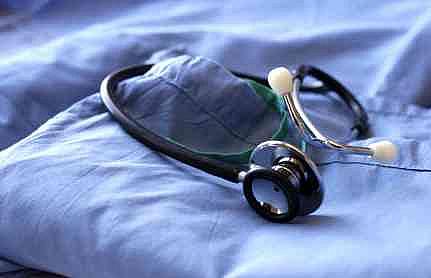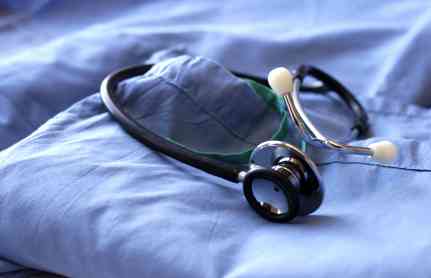Doctors sound off -- loudly -- about wearing scrubs on the street

 Dr. David C. Martin may be onto something.
Dr. David C. Martin may be onto something.
In three Antidote posts last week, he made the case that health care workers should not wear surgical scrubs out in public and that, if they are seen doing so, they should be confronted.
"Only after it is proven that scrubs in public cannot spread disease to others can we legitimately support the practice," he wrote.
His three-part piece, which ran Monday, Wednesday and Friday, generated a massive number of emails and tweets from physicians and other medical professionals. Many of them fell into Martin's camp. In the absence of evidence to the contrary, they wrote, why risk spreading dangerous pathogens such as MRSA by wearing scrubs to and from a hospital and dropping the deadly beasties on buses, in restaurants and at day cares along the way?
A few said that Martin was proposing a draconian solution to a relatively minor problem and that, should the health care field start clamping down on scrubs, they might as well prevent health care workers from carrying cell phones, laptops and all kinds of other objects that can ferry pathogens from the hospital to the home and everywhere in between.
And a few, including Skeptical Scalpel blogger Dr. James Barone, a Connecticut surgeon specializing in acute care and a fellow writer here at Reporting On Health, told me that, if nothing else, scrubs in public just look wrong.
"We have a tremendous image problem in the medical industry anyway," Barone told me. "Because of the perceived prevalence of medical errors, people are amazed that anyone can get through the ordeal of being in the hospital. So just for the sake of improving our image, we should probably leave the scrubs at home."
He elaborated on his thoughts in a post of his own last week.
Here's more of the best of what people had to say about the issue. I intend to explore some of these ideas more fully in future posts.
"I think it's primarily a matter of hubris, that doctors think they're above the rules. Add to that a tired/overworked effect. Doctors are hungry and stressed, so they go "grab" a sandwich without taking the time to go change first." – Medical Lessons blogger Dr. Elaine Schattner, a New York oncologist, clinical associate professor of medicine at Weill Cornell Medical College and new ReportingonHealth member.
"While I understand the concern of the anaesthetist, is he also mounting a campaign against pens, iPhones, pagers and stethoscopes, as all have been shown to harbour awful bacteria as well? That's not to say he's wrong, and perhaps we should in fact be mounting just such a campaign. Sometimes it's difficult to weigh utility vs. best practices. Certainly best practices would involve the removal or cleaning of all of those fomites before public exposure. Of course if we did, could there be potential harm in an MD not having a tool available for an urgent call, or could he or she be delayed while changing back? Were I mounting a campaign, it would likely still be for hand washing, as sadly, despite painfully clear cut risk, many don't wash as often or for as long as required. Given most people wash/recycle their scrubs daily, but likely never wipe down their smartphones, pens and scopes, I'd be willing to wager that the scrubs are the lesser evil of that bunch." - Dr. Yoni Freedhoff, founder and director of the Bariatric Medicine Institute in Ottawa and creator of the Weighty Matters blog. (Antidote interviewed Freedhoff in March.)
"I personally think it is a bit overboard. Twenty percent of people can carry resistant bacteria. Will we scan them and forbid from public places too?" – Dr. Howard J. Luks, associate professor of orthopedic surgery at New York Medical College, and chief of sports medicine and arthroscopy at University Orthopedics and Westchester Medical Center. (Translated from Twitterese.)
"With rare exceptions, such as unusual pathogens that survive as spores, microscopic organisms die quickly on dry surfaces. This is the basis for a common sign in hospitals that says, "If it's wet, wear gloves." By the time a doctor or nurse walks out of a hospital, I suspect that his or her scrubs are dry and no living organisms could be cultured from the fabric. In contrast, the person sitting next to you in a plane may be a reservoir of dangerous germs. His or her moist nose may be full of dangerous bacteria. He or she may cough up all sorts of nasty germs. That moist wad of Kleenex would probably culture out some interesting microbes. I also suspect that your main risk of infection in a restaurant is the person who sneezes or coughs while preparing your food, not the doctors sitting at another table with dry scrubs. The real risk of wearing scrubs outside a hospital may be the opposite of what this article implies."- Dr. Bruce Flamm, professor of obstetrics and gynecology at the University of California, Irvine, and health writer. (Antidote interviewed Flamm in November 2009.)
"A small change could make a bigger impact than we realize." – Dr. Harry Greenspun, chief medical officer at Dell Services healthcare group and a member of the World Economic Forum's Global Health Advisory Board.
"Given the choice between focusing on hand hygiene, an issue that has very clear data documenting transmission of infectious agents, and scrubs outside the hospital, a practice that has not been shown to be involved in disease transmission, most organizations would focus on the hands. Extending the argument about scrubs just a bit, you could argue that scrubs should not be worn in the public corridors of the hospital, in the gift shop or in the cafeteria. All are frequented by members of the public. Personally, I agree that the practice of wearing scrubs to and from the hospital and in the public is a bit untidy and perhaps elitist. Soiled scrubs are just wrong where ever they are worn. But I would say the same thing about a butcher wearing his or her soiled apron in public. I am reminded of an experience I had several years ago while fishing in Vermont. We stopped for lunch at a diner and were just served when a native came in from the dairy farm. We knew where he worked even before we turned. It was obvious that he had been in the barn from the smell and his clothing. As I read the piece, I had the image of that farmer in Vermont. He, like the physician and nurse, did not think about the image they were portraying and in the impact on others. While distasteful, arguing that scrubs are a public health menace is a bit of a stretch." – Harold DeMonaco, director of the Innovation Support Center at the Massachusetts General Hospital and one of the medical editors at Health News Review.
"In the 1980's when I did residency in NY, it was absolutely forbidden at my hospital (the Hospital for Joint Diseases Orthopaedic Institute) to be seen out of the OR in scrubs. You were to change in and out of and then back in again if you had to leave temporarily. It would be under threat of dismissal from the program if you ever saw a patient in anything but a white coat and tie. (I was once reprimanded for not having a tie on for a Saturday medical lecture by the Chief of the hospital, who gave me the key to his office to go get a tie immediately.) Yet outside the hospital, residents who would sneak out their scrubs and wear off hours usually did it to attract women by letting them know they were doctors .Fast forward to the present. Doctors, nurses, along with all sorts of ancillary medical providers like physical, respiratory and occupational therapists will wear scrubs all day long and then leave the hospital. I have little doubt that being around sick ICU patients with all sorts of infections can leave those bugs on the scrubs. Unless you're in the OR and change into new scrubs before you leave, then I would agree that the possibility of bringing hospital acquired bacteria and viruses to outside environs occurs." – Dr. Charles Rosen, clinical professor of orthopaedic surgery at the University of California, Irvine, founding director of the UCI Spine Center, School of Medicine, and president of the Association for Medical Ethics. (Antidote interviewed Rosen for one of our very first posts.)
Perhaps one of the best comments was from a fascinating little company called Patho Phizz. The company wrote, "Our scrubs already come with superbugs."
That's right. They make scrubs that are made of patterns of pictures of pathogens like E. coli, botulism and candida. The company sells them as fashion statements, not as part of a public health campaign, but think of the possibilities?
If Patho Phizz can make MRSA-patterned scrubs (and perhaps write MRSA in big football-style letters across the back) maybe health care workers would be less likely to wear them outside the hospital.
If you have thoughts on what should be done (if anything) about scrubs in public, send me a note at askantidote@gmail.com or respond in the comments below.

